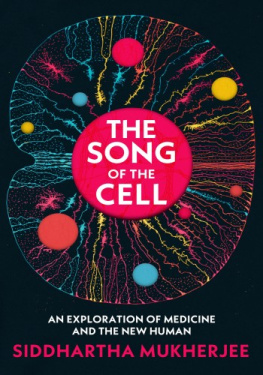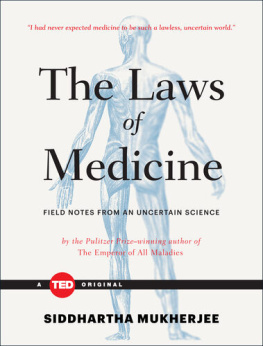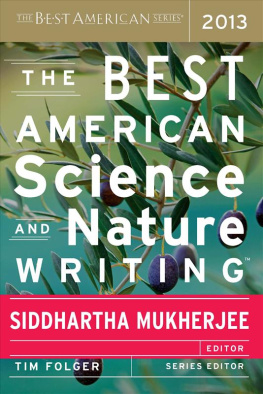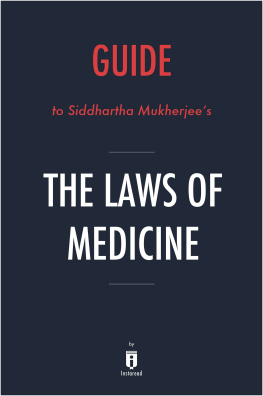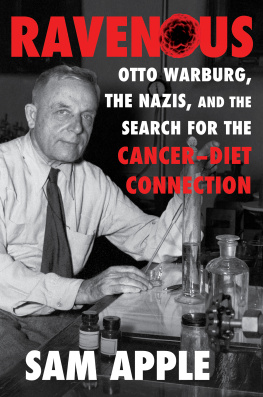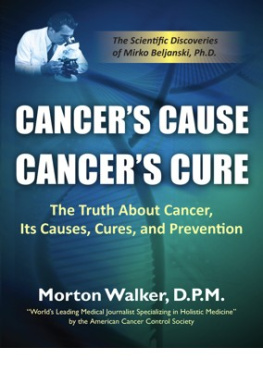


SCRIBNER
A Division of Simon & Schuster, Inc.
1230 Avenue of the Americas
New York, NY 10020
www.SimonandSchuster.com
Copyright 2010 by Siddhartha Mukherjee, M.D.
All rights reserved, including the right to reproduce this book or portions thereof
in any form whatsoever. For information address Scribner Subsidiary Rights Department,
1230 Avenue of the Americas, New York, NY 10020.
First Scribner hardcover edition November 2010
SCRIBNER and design are registered trademarks of The Gale Group, Inc.,
used under license by Simon & Schuster, Inc., the publisher of this work.
For information about special discounts for bulk purchases,
please contact Simon & Schuster Special Sales at 1-866-506-1949
or business@simonandschuster.com.
The Simon & Schuster Speakers Bureau can bring authors to your live event.
For more information or to book an event contact the Simon & Schuster Speakers Bureau
at 1-866-248-3049 or visit our website at www.simonspeakers.com.
Manufactured in the United States of America
1 3 5 7 9 10 8 6 4 2
Library of Congress Control Number: 2010024114
ISBN 978-1-4391-0795-9
ISBN 978-1-4391-8171-3 (ebook)
Photograph credits appear on .
To
ROBERT SANDLER (19451948),
and to those who came before
and after him.
night-side of life, a more onerous citizenship. Everyone who is born holds dual citizenship, in the kingdom of the well and in the kingdom of the sick. Although we all prefer to use only the good passport, sooner or later each of us is obliged, at least for a spell, to identify ourselves as citizens of that other place.
Susan Sontag
Contents
, without boyling
if I cant get better?
In 2010, about six hundred thousand Americans, and more than 7 million humans around the world, will die of cancer. In the United States, one in three women and one in two men will develop cancer during their lifetime. A quarter of all American deaths, and about 15 percent of all deaths worldwide, will be attributed to cancer. In some nations, cancer will surpass heart disease to become the most common cause of death.
Authors Note
This book is a history of cancer. It is a chronicle of an ancient diseaseonce a clandestine, whispered-about illnessthat has metamorphosed into a lethal shape-shifting entity imbued with such penetrating metaphorical, medical, scientific, and political potency that cancer is often described as the defining plague of our generation. This book is a biography in the truest sense of the wordan attempt to enter the mind of this immortal illness, to understand its personality, to demystify its behavior. But my ultimate aim is to raise a question beyond biography: Is cancers end conceivable in the future? Is it possible to eradicate this disease from our bodies and societies forever?
The project, evidently vast, began as a more modest enterprise. In the summer of 2003, having completed a residency in medicine and graduate work in cancer immunology, I began advanced training in cancer medicine (medical oncology) at the Dana-Farber Cancer Institute and Massachusetts General Hospital in Boston. I had initially envisioned writing a journal of that yeara view-from-the-trenches of cancer treatment. But that quest soon grew into a larger exploratory journey that carried me into the depths not only of science and medicine, but of culture, history, literature, and politics, into cancers past and into its future.
Two characters stand at the epicenter of this storyboth contemporaries, both idealists, both children of the boom in postwar science and technology in America, and both caught in the swirl of a hypnotic, obsessive quest to launch a national War on Cancer. The first is Sidney Farber, the father of modern chemotherapy, who accidentally discovers a powerful anti-cancer chemical in a vitamin analogue and begins to dream of a universal cure for cancer. The second is Mary Lasker, the Manhattan socialite of legendary social and political energy, who joins Farber in his decades-long journey. But Lasker and Farber only exemplify the grit, imagination, inventiveness, and optimism of generations of men and women who have waged a battle against cancer for four thousand years. In a sense, this is a military historyone in which the adversary is formless, timeless, and pervasive. Here, too, there are victories and losses, campaigns upon campaigns, heroes and hubris, survival and resilienceand inevitably, the wounded, the condemned, the forgotten, the dead. In the end, cancer truly emerges, as a nineteenth-century surgeon once wrote in a books frontispiece, as the emperor of all maladies, the king of terrors.
A disclaimer: in science and medicine, where the primacy of a discovery carries supreme weight, the mantle of inventor or discoverer is assigned by a community of scientists and researchers. Although there are many stories of discovery and invention in this book, none of these establishes any legal claims of primacy.
This work rests heavily on the shoulders of other books, studies, journal articles, memoirs, and interviews. It rests also on the vast contributions of individuals, libraries, collections, archives, and papers acknowledged at the end of the book.
One acknowledgment, though, cannot be left to the end. This book is not just a journey into the past of cancer, but also a personal journey of my coming-of-age as an oncologist. That second journey would be impossible without patients, who, above and beyond all contributors, continued to teach and inspire me as I wrote. It is in their debt that I stand forever.
This debt comes with dues. The stories in this book present an important challenge in maintaining the privacy and dignity of these patients. In cases where the knowledge of the illness was already public (as with prior interviews or articles) I have used real names. In cases where there was no prior public knowledge, or when interviewees requested privacy, I have used a false name, and deliberately confounded identities to make it difficult to track them. However, these are real patients and real encounters. I urge all my readers to respect their identities and boundaries.

Prologue
By desperate appliance are relieved,
Or not at all.
William Shakespeare,
Hamlet
. In the midst of scientific abstraction, it is sometimes possible to forget this one basic fact.... Doctors treat diseases, but they also treat people, and this precondition of their professional existence sometimes pulls them in two directions at once.
June Goodfield
On the morning of May 19, 2004, Carla Reed, a thirty-year-old kindergarten teacher from Ipswich, Massachusetts, a mother of three young children, woke up in bed with a headache. Not just any headache, she would recall later, but a sort of numbness in my head. The kind of numbness that instantly tells you that something is terribly wrong.
Something had been terribly wrong for nearly a month. Late in April, Carla had discovered a few bruises on her back. They had suddenly appeared one morning, like strange stigmata, then grown and vanished over the next month, leaving large map-shaped marks on her back. Almost indiscernibly, her gums had begun to turn white. By early May, Carla, a vivacious, energetic woman accustomed to spending hours in the classroom chasing down five- and six-year-olds, could barely walk up a flight of stairs. Some mornings, exhausted and unable to stand up, she crawled down the hallways of her house on all fours to get from one room to another. She slept fitfully for twelve or fourteen hours a day, then woke up feeling so overwhelmingly tired that she needed to haul herself back to the couch again to sleep.
Next page

